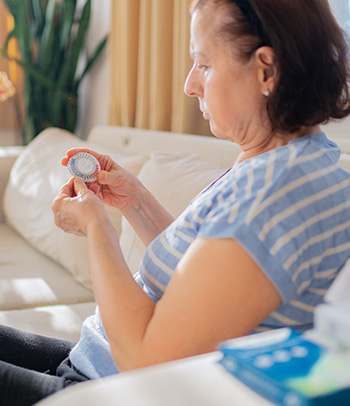When you’re informed about menopause, you can take the necessary steps to feel your best.
Many aspects of women’s health are talked about at great length, even celebrated, such as puberty, pregnancy, and childbirth. Menopause is a part of women’s health that is often left out of the discussion.
Menopause represents a significant transition in women’s lives and is a normal part of aging. Some women have mild symptoms or none. Other women have various symptoms like night sweats or pain during sex. These symptoms can often feel overwhelming.
Learn more about menopause, the effects it can have on your physical and mental health, and treatment options.
What Is Menopause?
There are three stages in the menopause cycle: perimenopause, menopause and post menopause. Menopause doesn’t happen all at once. Your body transitions to menopause over several years. Perimenopause is the menopausal transition, or the time leading up to your last period. Perimenopause usually starts in your mid to late 40s and can last for several years. As you begin this transition, your body’s production of estrogen and progesterone declines greatly.
Menopause is when your period stops permanently, and you can no longer get pregnant. You’ve fully reached menopause after a full year since your last period, with no bleeding or spotting for 12 months in a row. In the United States, the average age to begin menopause is 52. It can happen later or earlier for various reasons, including if you’ve never had children, smoke cigarettes, or have certain health problems.
Post-menopause is the period that follows menopause and will last the rest of your life.
How Can Menopause Affect Me?
Some women have very mild symptoms or none during both perimenopause and menopause. For women who have symptoms, they can vary a lot. Menopausal symptoms may include:
- Hot flashes or night sweats: Hot flashes are described as a sudden feeling of heat in the upper part of your body, face, and neck. You may experience red blotches, heavy sweating, or cold chills afterward.
- Trouble sleeping: Low levels of progesterone can make it hard to fall and stay asleep. You may also experience hot flashes or urinary symptoms that require you to get up several times a night.
- Irregular periods: As your body begins perimenopause, your periods may be longer or shorter than before or heavier or lighter. You may skip a few months and then have them start up again.
- Mood swings: You may experience general moodiness, mood swings, or increased irritability.
- Vaginal dryness: Low levels of estrogen may cause your vaginal tissue to get dryer and thinner. This can cause itching, burning, and pain, especially during sex.
- Bladder concerns: This can include urinary incontinence, or a loss in bladder control, and an increase in urinary tract infections.
- Problems with focus and memory: Many women may experience forgetfulness during menopause.
- Increased risk for depression and anxiety: Your risk for depression and anxiety is higher during menopause. This may be because of changing hormones, difficult menopausal symptoms, or both.
- Change in body shape and composition: During this time, your body begins to use energy differently, so you may notice a change in your body shape or composition.
After menopause, your ovaries make very low levels of estrogen and progesterone. These low levels can raise your risk for certain health problems, including:
- Osteoporosis
- Higher cholesterol levels
- Increased risk for heart disease and stroke
What Treatments Are Available?
Deciding to treat your symptoms is a personal one. Some women may find they don’t need treatment; others may want to explore options such as lifestyle changes or medications. When you’re ready, talk to your health care provider about your symptoms. Evaluate the pros and cons of each treatment to create a plan that’s right for you.
- Low-dose hormonal birth control: If you still have menstrual periods, low-dose hormonal birth control may help your symptoms, such as reducing hot flashes, vaginal dryness, and mood swings.
- Menopausal hormone therapy: Menopausal hormone therapy, or hormone replacement therapy, may treat menopause symptoms like hot flashes and night sweats before, during, and after menopause. However, it can also raise your risk for blood clots, stroke, and some cancers.
- Non-hormonal medicine: Other medicines, such as certain antidepressants, epilepsy medicine, and blood pressure medicine, may also help treat menopause symptoms.
Some women find relief with lifestyle changes, such as:
- Maintain a healthy weight: Hot flashes may be worse in women who are overweight or obese. Extra weight can also put more pressure on your bladder, leading to urinary issues.
- Use vaginal moisturizer or lubricant: Over-the-counter products can treat vaginal discomfort and dryness and may make sex more comfortable.
- Exercise: For menopausal women, exercise may help you get a good night’s sleep, improve your mood, and reduce your risk for depression and anxiety.
- Eat a healthy diet: After menopause, your risk for osteoporosis increases, so make sure you’re getting enough of the right nutrients for optimal bone health, such as vitamin D and calcium.
- Open up: All women go through menopause, and it may help you feel less isolated to talk about it. Reach out to supportive family and friends. Join a support group. Talk to your partner about what you’re going through.
- Get regular health care: Even after menopause, you will need regular mammograms, pap tests, cholesterol checks, and more to stay healthy.
- Quit smoking: Smoking can damage your bones and increase your risk for heart disease and cancer.
Resources
- TRICARE offers comprehensive women’s health care to ensure the health and readiness of women at every stage of life, including menopause.
- The Department of Veterans Affairs offers a variety of medical and non-medical treatments for menopausal symptoms. Talk to your primary care provider or speak to a Women Veterans Program Manager to coordinate services.
- MyMenoplan.org allows you to develop a personalized plan to handle your menopause symptoms. The tool helps you sort out the best treatment options based on your preferences, such as whether you want to take medications or avoid them.
- The M Factor, a PBS documentary about menopause, includes a resource guide with many helpful components, including a symptom tracker, a chart filled with potential solutions to your symptoms, and more.
When you’re informed about menopause, you can take the necessary steps to feel your best.







